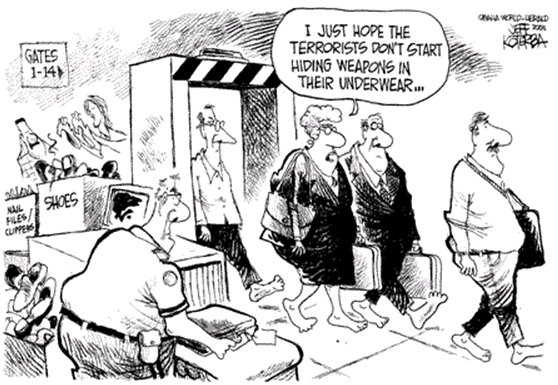
A dispute about social inequalities in the United States, so topical before the presidential election, is taking place at the airports as well. The question is: Can some passengers be treated better than others during the inspection?
Drastically toughened after 9/11, inspections at American airports have proceeded so far according to absolutely democratic rules: With no exceptions, everyone used to be subject to similar, painstaking procedures. Wait in a long line, take your belt and shoes off, take the computer out of your bag, pass through the metal detector barefoot. Sometimes, if you are unlucky or seem suspicious, two guards will take you to a separate room, where one of them will make a body search, which means he will pat the whole of your body, including the unmentionables; another will observe to remove the suspicion of wicked fondling by the first one (and both of them will heartily apologize with each pat).
These rules used to apply to everyone, regardless of how much he/she paid for the ticket, what state post he/she holds or how many billions he/she amassed on an account. Also, regardless of how much time to departure he/she has left. In the U.S. nobody makes a fuss for latecomers; they are not sent, as in Europe, to priority gates to catch the plane.
Six months ago, Sen. Rand Paul, a favorite of the American right wing, experienced the airport democracy when a gate at the Nashville airport detected something suspicious on him. The senator did not want to be subjected to the patting procedure, which some people called fondling; consequently he did not fly anywhere and was even detained for some time in a small room as a potentially dangerous person.
When patting/fondling was first introduced two years ago in the U.S., some people suggested applying procedures similar to the ones utilized in Israel. At the Ben Gurion airport in Tel Aviv, guards choose passengers of high risk for a detailed inspection who are — frankly speaking — mostly Arabs or Muslims. However, narrowing, as this safety procedure is professionally called, was rejected categorically in the U.S.
“No one in the U.S. will be suspected because of appearance,” repeats President Barack Obama on many occasions.
The issue became almost a taboo subject. Well-known public radio journalist Juan Williams was fired for one sentence said on television: “When I see somebody in a turban come into my plane, I feel things are heating up…”
Anyway, something has changed recently: The main airlines created priority gates for business class and selected frequent flyer passengers with the Transportation Security Administration’s approval. Since they pay more, they do not have to stand in a line, take their shoes off and take their computers out.
The issue, seemingly natural, is rather controversial. Everyone agrees easily to a common practice that airlines let “better” passengers onto a plane first — those who paid more for the tickets. Yet passing through security gates, charged by the government, is another pair of shoes.
After 9/11, $2.50 was added to every ticket for security matters; this money goes to the TSA. If all passengers pass the hat around for their safety in equal measure, what gives some of them the right to be favored at the gates?
This question is posed, among others, by Sen. Ben Nelson of Nebraska, who worked out a bill forbidding favoring passengers during inspection (it is now waiting for its turn in the Senate). Airlines wish it all the worst; the rich, disheartened with painstaking inspections, in the end will not fly with business class, but will rent or buy a private jet.
“It is like reserving separate lines on public roads for owners of better cars — the newest Mercedeses, Lexuses and BMWs,” says Slate Magazine, which describes the airport dilemma of the TSA. The solution seems to be obvious: The common collection of $2.50 should be given up. Passengers who are in a rush can pay $10 or $20 for the TSA. Thus, the exemplary American airport democracy will be saved.

Leave a Reply
You must be logged in to post a comment.